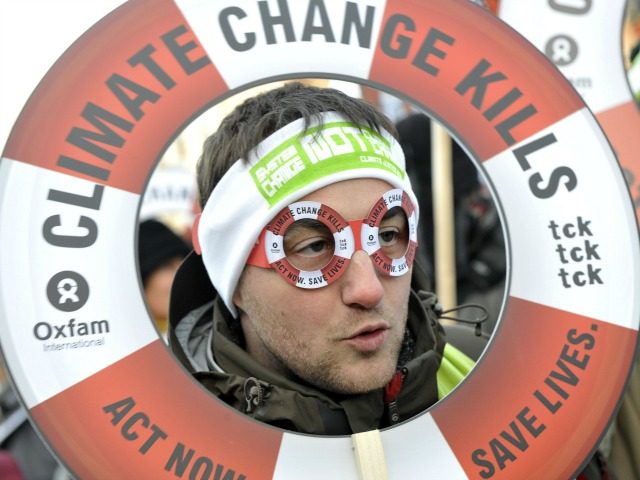Prominent Swedish progressive Andreas Malm has urged using the full coercive power of the state to curb fossil fuel emissions, modeling the response on global coronavirus lockdowns.
The global response to the coronavirus pandemic, which justified massive incursions into civil liberties in the name of public health, offers a model for how to address climate change, Mr. Malm contends, by taking decision-making out of the hands of individuals and delivering it over to the state.
In an interview published Monday with the leftist magazine Jacobin, Malm, who runs the master’s program in human ecology at Lund University, suggests that the moment may have finally arrived to empower governments to dramatically rearrange the world economy to stop climate change.
“There was a moment in March 2020 when many of us in the climate justice movement felt a degree of surprise to find that governments in Europe and elsewhere were prepared to basically shut down their entire economies in an effort to contain the pandemic,” Malm notes. “This is striking, given that the same states had never contemplated undertaking any kind of intervention in the economy for the sake of the climate crisis.”
The reason for this difference in response, Malm suggests, is that the coronavirus disproportionately struck the rich, whereas the effects of climate change seem to never reach the affluent. Moreover, the lockdowns were a luxury that the rich could afford, whereas the poor and middle class suffered their effects more acutely.
“This is a moment where we can say to governments: ‘If you were able to intervene to protect us from the virus, you can intervene to protect us from the climate crisis as well, the implications of which are much worse,’” Malm proposes. “The current juncture therefore provides us with an opportunity to oppose the return to business as usual, to push for the transformation of the global economy and the launch of something like a Green New Deal.”
Malm rues the “sudden obliteration of the climate justice movement” effected by the coronavirus in terms of environmental movements such as Fridays for Future, Extinction Rebellion, and Ende Gelände.
“Prior to this, there had been a growing momentum toward aggressively disrupting business as usual, and while there have been attempts to temporarily move these actions online, there is simply no way to exert the same kind of pressure through digital means,” he laments.
In analyzing which political forces will be best positioned to benefit from the situation of mass unemployment and social dislocation wrought by the lockdowns, Malm suggests that “it will be the far right, simply because it was in a much stronger position prior to the outbreak of COVID-19 and also because the pandemic has reinforced certain nativist political paradigms, in terms of closing the borders, putting one’s nation first, and a suspicion of foreigners.”
Politically, therefore, “there can be no climate mitigation without a massive defeat of the far right in advanced capitalist countries and in many developing states as well,” he contends.
“A successful strategy to address the climate crisis will need to find a way to weave together environmental justice, working-class struggle, and opposition to the far right,” he declares, and yet the actual destruction of fossil capital itself, including the closure of coal mines and the termination of mass aviation can only come about through “increased state control over large swaths of the economy.”
The sort of dramatic change that is needed is “totally impossible to do simply by tinkering with market mechanisms or introducing some carbon taxes; rather, it will require a massive expansion of state ownership and comprehensive economic planning.”
The effectiveness of an empowered state has been demonstrated by the pandemic, Malm argues, and the same force must be brought to bear on the climate change issue.
“You cannot deal with the factors driving these pandemics by appealing to individual citizens to change their ways, just as you cannot address climate change through altering one’s consumption patterns,” he states.
Thus, “some forms of consumption will indeed have to be limited or abolished outright — this cannot be done through markets or appeals to ethical consumption, but only through state regulation,” he asserts.
While insisting that not “everything that the Bolsheviks did during the Russian Civil War” can be copied outright, the idea of “ecological war communism” can provide a model for countries to follow in dealing with the climate crisis, he states.
War communism “provides an example of a rapid, state-driven transformation of production and the organization of the economy in the face of massive opposition from the dominant classes,” he argues. “A green transition will also require a degree of coercive authority to be imposed on fossil fuel companies that have so far done everything in their power to postpone and obstruct climate change mitigation.”
Since capitalism needs to be challenged for any meaningful transition to occur, Malm continues, and we cannot move by incremental steps toward a socialist society, it is necessary to look to part of the socialist legacy that has an idea of catastrophe.
“It is incredibly difficult to see how anything other than state power could accomplish the transition required, given that it will be necessary to exert coercive authority against those who want to maintain the status quo,” he insists.
“The whole strategic direction of Lenin after 1914 was to turn World War I into a fatal blow against capitalism,” he concludes. “This is precisely the same strategic orientation we must embrace today — and this is what I mean by ecological Leninism.”
“We must find a way of turning the environmental crisis into a crisis for fossil capital itself,” he says.

COMMENTS
Please let us know if you're having issues with commenting.